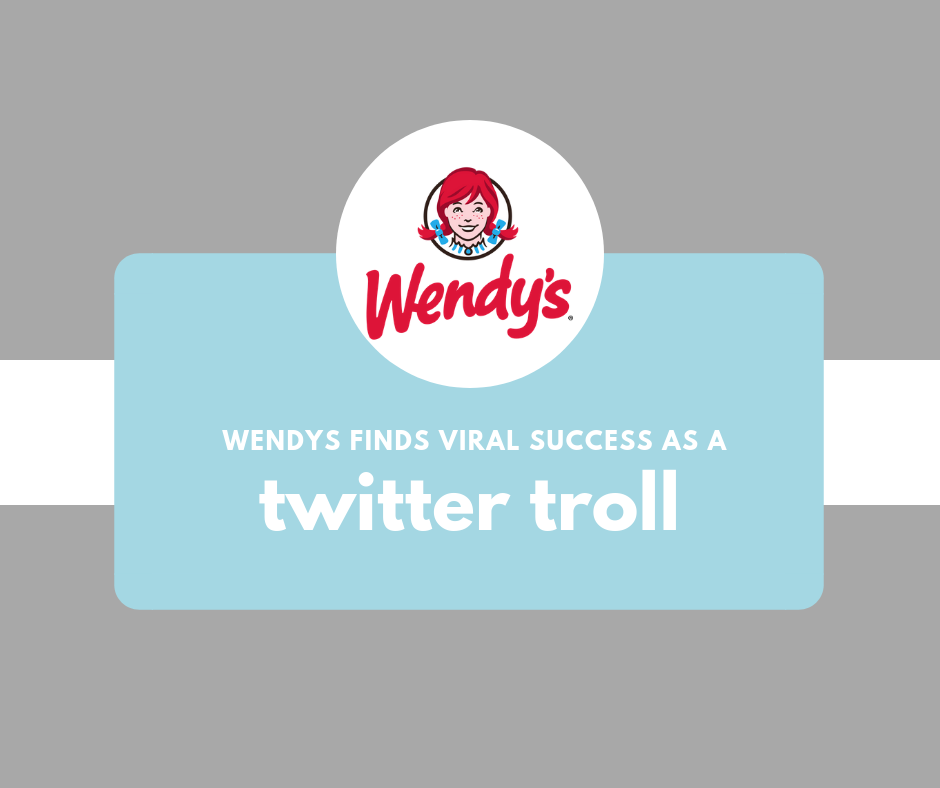The most retweeted tweet on Twitter in 2017 may surprise you. It was not a politician or a member of One Direction who took the top spot. It was a response to a tweet about chicken nuggets by fast food chain Wendy’s that took the crown with over 3.5 million retweets.
Clearly the team behind Wendy’s social media is doing something right. Their unorthodox public relations campaign has made them a viral sensation on Twitter.
Over the past few years, Wendy’s has seen a massive increase in user engagement on Twitter. After starting their campaign, they gained 350,000 followers in one month alone. Today they are sitting at over 2.8 million followers. This kind of viral success is rare, and something that every public relations team dreams of.
So what is it that makes Wendy’s stand out in the sea of online content?
While many corporate Twitter accounts are formal and professional, Wendy’s is the exact opposite. The fast food chain takes on the role of internet troll — tweeting sassy, provocative responses to users and competitors. McDonald’s and Burger King are some of their favourite targets.
Seeing a major brand take on this role is unexpected, and undeniably funny. Wendy’s is doing one thing very well from a public relations standpoint — knowing and appealing to their target audience of millennials. Adults between the ages of 18-34 are the most likely to follow a brand on social media, and are active participants in online culture.
The social media team behind the Wendy’s Twitter account has proven that they have a firm grasp on this culture, which is often rooted in parody. Humour and sarcasm are tools that go a long way on Twitter, and Wendy’s has embraced this.
In the age of constant stimulation, it is difficult to capture a users attention. However Wendy’s has successfully made their tweets stand out from all of the noise. There is a human voice behind the tweets, and that authenticity is valuable.
Other major brands are following suit and adopting the trolling persona on their social media. Brands like Arby’s, Denny’s, and Pizza Pops have all embraced the informal, sarcastic language of the internet.
Even streaming giant Netflix has joined in the fun, with a viral tweet poking fun at viewers who watched the same movie a few too many times.

However, this tweet illustrates how playing the internet troll can be a high risk, high reward strategy for brands. While the tweet was unarguably a viral success, Netflix also faced widespread criticism from users concerned about privacy and the tracking of their personal data.
It’s easy to say the wrong thing on social media, and one mistake can be seriously damaging.
But brands like Wendy’s prove that when it’s done right, humour and sarcasm can go a long way on the internet. It’s unclear whether this strategy transferred into actual sales for the company, but it certainly got people talking. And from a public relations perspective, thats a win.
__
Allison Davis – Editor
“Left at the alter, gained 20 pounds, and losing millions!” This is, in one form or another, a headline we all have seen, read, and have even felt tempted to grab while in the checkout line at the supermarket. But, what is the cost of these published headlines? At what cost do these headlines sacrifice both the integrity and privacy of the targeted public figures?
When people are placed on a pedestal in society, it is easy to pass judgements; easy to forget they are human. However, what we must not forget now more than ever — given the current atmosphere in the United States— is that we are all humans, and we all deserve fundamental human rights. Every person, regardless of their celebratory status, is deserving of privacy.
Actress Jennifer Aniston recently wrote an opinion editorial for the Huffington Post, addressing her stance on gossip-centered tabloids. She stated that, “we use celebrity ‘news’ to perpetuate this dehumanizing view of females, focused solely on one’s physical appearance, which tabloids turn into a sporting event of speculation.”
Aniston suggests that the very nature of tabloids instill poor ideals in younger generations. For example, young girls who grow up to accept the dehumanization of celebrities through objectification as socially acceptable believe that the behavior can eventually be reciprocated to anyone — not just those featured on magazine covers.
The piece raises important points. It ultimately states that the creation of gossip due to the invasion of privacy of public figures is promoting a future generation of coldness, not kindness — an attribute we do not want to foster.
As former Canadian Prime Minister Pierre Elliot Trudeau once stated in 1967, “There’s no place for the state in the bedrooms of the nation.”Although Trudeau said this as an appeal for the decriminalization of private homosexual acts, the statement remains relevant today. His words emphasize the necessary divide between personal and professional lives.
The private affairs of citizens should not only be avoided by the state, but by the press as well. Since public figures are citizens, and the state strays from our own bedrooms, why shouldn’t public figures deserve the same respect?
There are few events as heartbreaking as when the news broke regarding Princess Diana’s tragic death. The “People’s Princess” was ultimately killed in a car accident while attempting to outrun the paparazzi. Although the situation can be described in a multitude of brokenhearted synonyms, it can also be coined as preventable.
The highly competitive entertainment industry instills the idea that any money generated by paparazzi is the priority, with the lives of those involved being an afterthought. If society granted public figures the fundamental right of privacy, lives, such as the one of Princess Diana, would not be lost over ill-founded beliefs.
Article 8 of the European Convention on Human Rights states that, “everyone has the right to respect for his private and family life, his home and his correspondence.” The keyword here is “everyone” —even those fortunate enough to be deemed famous. Public figures do not enter their respected industries hoping to create a living by making their lives a spectacle, they enter their industries to fulfill their occupational duties with passion. Next time you reach for UsWeekly’s Stars – They’re Just Like Us, remember they truly are just like us. They are only human.
Bibliography
Aniston, J. (2016, July 12). Jennifer Aniston: ‘For The Record’ Retrieved March 06, 2017, from http://www.huffingtonpost.com/entry/for-the-___record_us_57855586e4b03fc3ee4e626f
MacLean, S. (2014, April 13). Our high-seas, risk-running culture must change. Retrieved March 06, 2017, from http://thechronicleherald.ca/opinion/1189659-our-high-seas-risk-running-_culture-must-change
Murphy, A. (2017, March 2). (Mount Saint Vincent University’s Writing Tutor).
Whitney, C. B. (1997, August 31). Diana Killed in a Car Accident in Paris. Retrieved March 06, 2017, from http://www.nytimes.com/learning/general/onthisday/big/0831.html
“Article 8 ECHR.” (n.d.). Retrieved March 06, 2017, from http://echr-online.info/article-8-echr/
“CBC Archives” Trudeau: ‘There’s no place for the state in the bedrooms of the nation’ – CBC ___Archives. (2013, April 10). Retrieved March 06, 2017, from http://www.cbc.ca/archives/entry/omnibus-bill-theres-no-place-for-the-state-in-the-_bedrooms-of-the-nation
__
Paighton Arseneault




